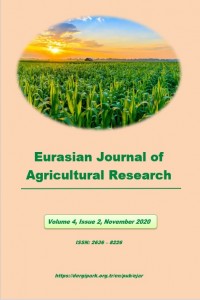Abstract
Project Number
no project number
References
- Aboelill, A.A., H.M. Mehanna, O.M. Kassab and E.F. Abdallah. (2012). The Response of Peanut to Foliar Spraying with Potassium Under Water Stress Conditions. Australian Journal of Basic and Applied Sciences, 6(8): 626-634.
- AVRDC. (2006). Association of International Research and Development Centers for Agriculture Conference. ACIAR; Australia. 7:27-46pp. Brandenburg, R.L., D.L. Jordan, B.R. Royals, D.J. Mahoney and P.D. Johnson. (2019). Utilization of Imidacloprid to Control Pests in Peanut in North Carolina. Peanut Science 46:1, 8-13. Online publication date: 24-Apr-2019.
- FAO, (2016). Food and Agriculture Organization of the United Nations, Rome, Italy.
- Jordan, D. L., R. Brandenburg, B. Brown, G. Bullen, G. Roberson, and B. Shew. (2017). Peanut Information. North Carolina Cooperative Extension Service Pub. AG-331. 172 pages.
- Kalinova, S., S. Kostadinova and A. Hristoskov. (2014). Nitrogen use efficiency and maize yield response to nitrogen rate and foliar fertilizing. Bulgarian Journal of Agricultural Science, No. 20, pp.
- Krawczyk, M. L. (2018). Make Your Own Liquid Garden Fertilizer, URL: http://goo.gl/k80xwW,Date Retrieved: May 16, 2018
- Lalog, J. T. (2011). Dynapharm Company Incorporation, Quezon City, Philippines
- Landon, J. R. (1991). Booker Tropical Soil Manual. Longman Scientific and Technical/Ezzex, England p.474 Marschner, H. I. (1997). Mineral nutrition of higher plants. 2nd ed. San Diego: Academic Press, 889p.
- Meena, S., M. Malarkodi and P. Senthilvalavan. (2007). Secondary and micronutrients for groundnut. A review. Agric. Rev., 28(4):295- 300
- Mungkunkamchao, T., Kesmala, T., Pimratch, S., Toomsan, B., and Jothityangkoon, D. (2013). Wood vinegar and fermented bioextracts: Natural products to enhance growth and yield of tomato. Sci. Hortic-Amsterdam. 154, 66-72.
- NCT Manual for Legumes. Revised. (2017). Guidelines in conducting National Cooperative Testing in Field Legumes. Field legumes Technical Working Group. Bureau of Plant Industry. Diliman, Quezon City. Revised 2017.
- Travero, J. T. and Mihara, M. (2016). Effects of pyroligneous acid to growth and yield of soybean (glycine max L.). International Journal of Environmental and Rural Development.7,50-54.
Enhancing Yield and Profitability of Peanut (Arachis hypogaea L.) to Application of Different Organic Foliar Fertilizer
Abstract
One strategy to produce enough, healthy, and safer products is to apply the best practices by using locally produced organic bio-fertilizer as nutrients for the crops. This study aimed to evaluate the effects, determine the appropriate, and assess the profitability of using locally produced organic foliar fertilizers on peanut production. The treatments designated as follows: T1 = Control (no application), T2 = Power grow 100 ml/16li H2O, T3 = Vermi tea 100 ml/16li H2O, T4 = Poultry litter tea100 ml/16li H2O, and T5 = Wood vinegar 100 ml/16li H2O. The experiment was laid out in Randomized Complete Block Design (RCBD) with three replications. Each replication was divided into five (5) treatment plots measuring twelve (12) m2 separated by 1 m alleyways between replications and treatment plots to facilitate farm operations and data gathering. The treatment plants were sprayed with foliar fertilizer six times at weekly intervals, starting two weeks up to the pick of the peanut plants' last flowering. Results showed that peanut plants flowered early when applied with poultry litter tea but obtained a high leaf area index (LAI) and weight of 1,000 seeds (g) when applied with Power grow foliar fertilizer. Application of poultry litter tea obtained the highest seed yield of 1.470 t ha-1 and achieved the highest gross margin of PhP48,965.00 ha-1. Control plants (no application) obtained the lowest seed yield of 0.87 t ha-1, which led to a lower gross margin of PhP18,750 ha-1. In terms of pest incidence, no serious presence of insects and diseases were noted; thus, a high to moderate resistance rating was obtained in all treatment plants.
Supporting Institution
Visayas State University
Project Number
no project number
Thanks
Thank you
References
- Aboelill, A.A., H.M. Mehanna, O.M. Kassab and E.F. Abdallah. (2012). The Response of Peanut to Foliar Spraying with Potassium Under Water Stress Conditions. Australian Journal of Basic and Applied Sciences, 6(8): 626-634.
- AVRDC. (2006). Association of International Research and Development Centers for Agriculture Conference. ACIAR; Australia. 7:27-46pp. Brandenburg, R.L., D.L. Jordan, B.R. Royals, D.J. Mahoney and P.D. Johnson. (2019). Utilization of Imidacloprid to Control Pests in Peanut in North Carolina. Peanut Science 46:1, 8-13. Online publication date: 24-Apr-2019.
- FAO, (2016). Food and Agriculture Organization of the United Nations, Rome, Italy.
- Jordan, D. L., R. Brandenburg, B. Brown, G. Bullen, G. Roberson, and B. Shew. (2017). Peanut Information. North Carolina Cooperative Extension Service Pub. AG-331. 172 pages.
- Kalinova, S., S. Kostadinova and A. Hristoskov. (2014). Nitrogen use efficiency and maize yield response to nitrogen rate and foliar fertilizing. Bulgarian Journal of Agricultural Science, No. 20, pp.
- Krawczyk, M. L. (2018). Make Your Own Liquid Garden Fertilizer, URL: http://goo.gl/k80xwW,Date Retrieved: May 16, 2018
- Lalog, J. T. (2011). Dynapharm Company Incorporation, Quezon City, Philippines
- Landon, J. R. (1991). Booker Tropical Soil Manual. Longman Scientific and Technical/Ezzex, England p.474 Marschner, H. I. (1997). Mineral nutrition of higher plants. 2nd ed. San Diego: Academic Press, 889p.
- Meena, S., M. Malarkodi and P. Senthilvalavan. (2007). Secondary and micronutrients for groundnut. A review. Agric. Rev., 28(4):295- 300
- Mungkunkamchao, T., Kesmala, T., Pimratch, S., Toomsan, B., and Jothityangkoon, D. (2013). Wood vinegar and fermented bioextracts: Natural products to enhance growth and yield of tomato. Sci. Hortic-Amsterdam. 154, 66-72.
- NCT Manual for Legumes. Revised. (2017). Guidelines in conducting National Cooperative Testing in Field Legumes. Field legumes Technical Working Group. Bureau of Plant Industry. Diliman, Quezon City. Revised 2017.
- Travero, J. T. and Mihara, M. (2016). Effects of pyroligneous acid to growth and yield of soybean (glycine max L.). International Journal of Environmental and Rural Development.7,50-54.
Details
| Primary Language | English |
|---|---|
| Subjects | Agricultural Engineering |
| Journal Section | Articles |
| Authors | |
| Project Number | no project number |
| Publication Date | November 30, 2020 |
| Published in Issue | Year 2020 Volume: 4 Issue: 2 |

